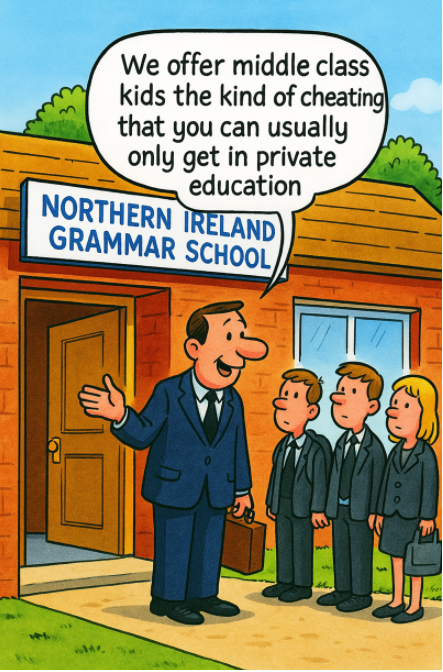Choice or Inequality? Rethinking Grammar Schools in Northern Ireland
Workers Party member DEAN BURKE argues that grammar schools do not raise overall standards. Instead, they reflect existing inequalities by sorting children according to the advantages they already have, concentrating opportunity rather than expanding it.

A recent article in the Belfast Telegraph (29 September 2025) about Campbell College’s new principal and his defence of the grammar school system, “choice is key”, raises an important question about the existence and future of Northern Ireland’s grammar school system. For decades, defenders of academic selection have framed grammar schools as a matter of parental choice, a supposed luxury of diversity that encourages aspiration and rewards hard work. These arguments are nothing new, and they obscure a much harsher truth.
The Workers Party has long called for equality within education. In reality, the notion of choice within the grammar school system is largely illusory. Grammar school entrants are far more likely to come from privileged backgrounds and those with the resources to afford private tuition and early preparation. A system that sorts children at ten or eleven years of age does not expand opportunity. It restricts it, particularly for those from working-class communities, children with special educational needs, and those already disadvantaged by circumstance. That is not meaningful choice. It is structural inequality.

That inequality is deepened by the fact that decisions shaping children’s futures are outsourced to private companies. These organisations design and administer the tests that determine entry to grammar schools. Commercial bodies should not be allowed to decide who gains access to public education or to profit from that control. Education is a public good, not a marketplace. It should be democratically planned, publicly funded and delivered for social need, not private profit.
Academic selection and high-stakes examinations at such an early age are educationally and developmentally premature. Grammar schools do not raise overall standards. They reflect existing inequalities by sorting children according to the advantages they already have, concentrating opportunity rather than expanding it. For many children who do not gain a place, the experience of being told they have “failed” before starting secondary school can be profoundly damaging. It can erode confidence, affect motivation, and shape self-belief for years to come. No child should feel their future has been decided at the age of ten. Parents know this too. The stress and stigma affect families, not just children.
If we truly value aspiration, equality and community, then every child must have access to high-quality education without the barriers of selection, postcode or privilege. True choice means investment in all schools, in every community, with equal resources, strong pastoral care, and inclusive teaching.
Segregating children by perceived ability entrenches division in a society that needs cohesion, not further separation. The grammar school system belongs to another era. The Workers Party believes that education must serve the many, not the few. A truly democratic and socialist education system is one where every child can learn, achieve and thrive together.
